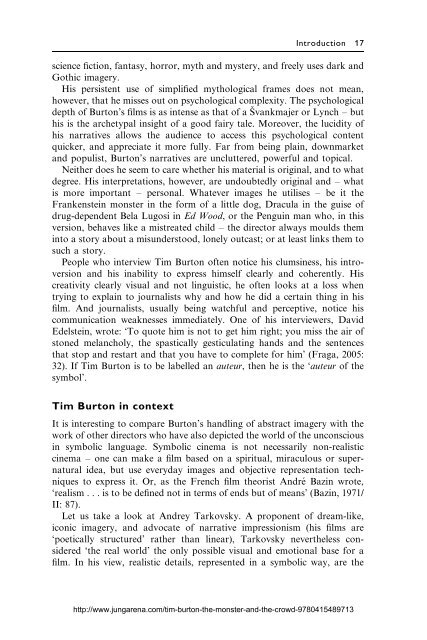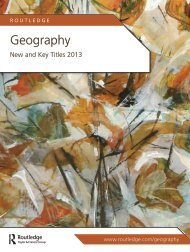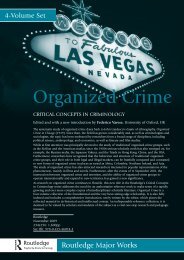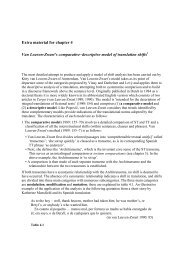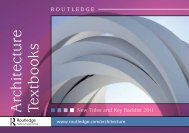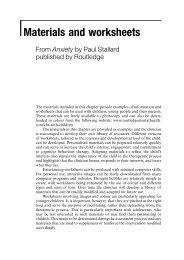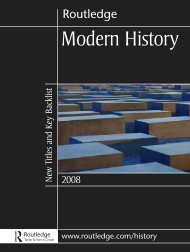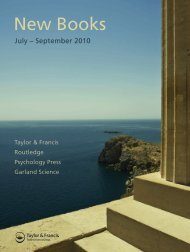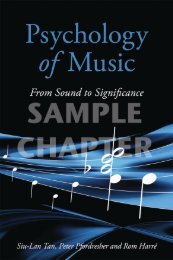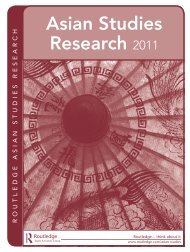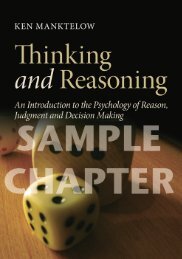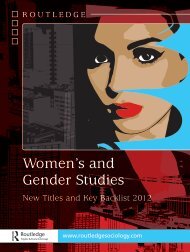Tim Burton: The Monster and the Crowd - A Post-Jungian Perspective
Tim Burton: The Monster and the Crowd - A Post-Jungian Perspective
Tim Burton: The Monster and the Crowd - A Post-Jungian Perspective
You also want an ePaper? Increase the reach of your titles
YUMPU automatically turns print PDFs into web optimized ePapers that Google loves.
science ®ction, fantasy, horror, myth <strong>and</strong> mystery, <strong>and</strong> freely uses dark <strong>and</strong><br />
Gothic imagery.<br />
His persistent use of simpli®ed mythological frames does not mean,<br />
however, that he misses out on psychological complexity. <strong>The</strong> psychological<br />
depth of <strong>Burton</strong>'s ®lms is as intense as that of a S Ï vankmajer or Lynch ± but<br />
his is <strong>the</strong> archetypal insight of a good fairy tale. Moreover, <strong>the</strong> lucidity of<br />
his narratives allows <strong>the</strong> audience to access this psychological content<br />
quicker, <strong>and</strong> appreciate it more fully. Far from being plain, downmarket<br />
<strong>and</strong> populist, <strong>Burton</strong>'s narratives are uncluttered, powerful <strong>and</strong> topical.<br />
Nei<strong>the</strong>r does he seem to care whe<strong>the</strong>r his material is original, <strong>and</strong> to what<br />
degree. His interpretations, however, are undoubtedly original <strong>and</strong> ± what<br />
is more important ± personal. Whatever images he utilises ± be it <strong>the</strong><br />
Frankenstein monster in <strong>the</strong> form of a little dog, Dracula in <strong>the</strong> guise of<br />
drug-dependent Bela Lugosi in Ed Wood, or <strong>the</strong> Penguin man who, in this<br />
version, behaves like a mistreated child ± <strong>the</strong> director always moulds <strong>the</strong>m<br />
into a story about a misunderstood, lonely outcast; or at least links <strong>the</strong>m to<br />
such a story.<br />
People who interview <strong>Tim</strong> <strong>Burton</strong> often notice his clumsiness, his introversion<br />
<strong>and</strong> his inability to express himself clearly <strong>and</strong> coherently. His<br />
creativity clearly visual <strong>and</strong> not linguistic, he often looks at a loss when<br />
trying to explain to journalists why <strong>and</strong> how he did a certain thing in his<br />
®lm. And journalists, usually being watchful <strong>and</strong> perceptive, notice his<br />
communication weaknesses immediately. One of his interviewers, David<br />
Edelstein, wrote: `To quote him is not to get him right; you miss <strong>the</strong> air of<br />
stoned melancholy, <strong>the</strong> spastically gesticulating h<strong>and</strong>s <strong>and</strong> <strong>the</strong> sentences<br />
that stop <strong>and</strong> restart <strong>and</strong> that you have to complete for him' (Fraga, 2005:<br />
32). If <strong>Tim</strong> <strong>Burton</strong> is to be labelled an auteur, <strong>the</strong>n he is <strong>the</strong> `auteur of <strong>the</strong><br />
symbol'.<br />
<strong>Tim</strong> <strong>Burton</strong> in context<br />
Introduction 17<br />
It is interesting to compare <strong>Burton</strong>'s h<strong>and</strong>ling of abstract imagery with <strong>the</strong><br />
work of o<strong>the</strong>r directors who have also depicted <strong>the</strong> world of <strong>the</strong> unconscious<br />
in symbolic language. Symbolic cinema is not necessarily non-realistic<br />
cinema ± one can make a ®lm based on a spiritual, miraculous or supernatural<br />
idea, but use everyday images <strong>and</strong> objective representation techniques<br />
to express it. Or, as <strong>the</strong> French ®lm <strong>the</strong>orist Andre Bazin wrote,<br />
`realism . . . is to be de®ned not in terms of ends but of means' (Bazin, 1971/<br />
II: 87).<br />
Let us take a look at Andrey Tarkovsky. A proponent of dream-like,<br />
iconic imagery, <strong>and</strong> advocate of narrative impressionism (his ®lms are<br />
`poetically structured' ra<strong>the</strong>r than linear), Tarkovsky never<strong>the</strong>less considered<br />
`<strong>the</strong> real world' <strong>the</strong> only possible visual <strong>and</strong> emotional base for a<br />
®lm. In his view, realistic details, represented in a symbolic way, are <strong>the</strong><br />
http://www.jungarena.com/tim-burton-<strong>the</strong>-monster-<strong>and</strong>-<strong>the</strong>-crowd-9780415489713


